Introduction
AI chatbots in healthcare have emerged as powerful tools for enhancing patient care and streamlining medical operations.
The global healthcare chatbot market is projected to reach $543.65 million by 2026, growing at a CAGR of 20.3% from 2019 to 2026, according to Allied Market Research.
This surge in adoption highlights the increasing recognition of chatbots for healthcare as essential components of modern medical practice.
AI chatbots for healthcare are revolutionizing patient engagement, with 64% of patients reporting positive experiences with these digital assistants, according to a 2023 Accenture study.
From appointment scheduling to symptom assessment, the best healthcare chatbots are providing 24/7 support, reducing the burden on healthcare professionals while improving patient outcomes.
The versatility of AI chatbots in healthcare is remarkable, with applications ranging from mental health support to medication management.
A recent survey by Juniper Research predicts that AI chatbots in healthcare will save the healthcare industry $3.6 billion globally by 2026, demonstrating their significant impact on operational efficiency.
As we explore 9 innovative ideas for healthcare chatbot applications, we'll see how these AI-powered assistants are not just improving patient care but also transforming the entire healthcare ecosystem.
1. Personalized Health Information & Education
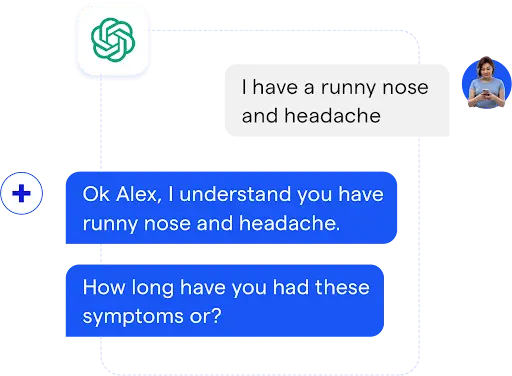
The healthcare chatbot can act as first-point-of-contact resources, providing answers to frequently asked questions.
This immediate response system helps reduce wait times and improves patient satisfaction.
Providing Tailored Health Information Based on Demographics & Conditions
Chatbots in healthcare can deliver customized health information relevant to a patient's specific demographics and medical conditions, making advice more applicable and useful.
Delivering Educational Content on Specific Diseases and Treatments
AI chatbots in healthcare play a crucial role in educating patients about their conditions and the available treatment options, empowering them with the knowledge to make informed decisions.
2. Streamlined Appointment Scheduling & Management
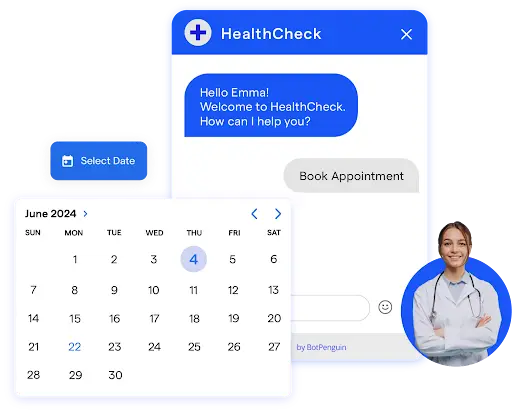
The healthcare chatbot can quickly sift through schedules to find available appointments with various specialists, simplifying the booking process.
Rescheduling or Canceling Appointments Easily
Patients can conveniently reschedule or cancel appointments using a healthcare chatbot, integrating flexibility into their healthcare management.
Integrating with Patient Calendars for Reminders and Updates
Healthcare chatbot can sync with personal calendars to send reminders and updates, ensuring patients are prepared and on time for their appointments.
3. Proactive Care & Early Intervention
Healthcare chatbot can send timely reminders for medication refills, ensuring continuous care without interruption.
Offering Personalized Wellness Tips and Disease Prevention Strategies
By analyzing patient data, chatbots provide personalized wellness tips and strategies for disease prevention, promoting a healthier lifestyle.
Encouraging Patients to Follow Up on Test Results and Doctor Recommendations
Regular follow-ups are crucial for effective healthcare.
Chatbots can remind patients to check their test results and adhere to doctor’s recommendations, facilitating proactive health management.
4. Mental Health Support & Self-Care Resources
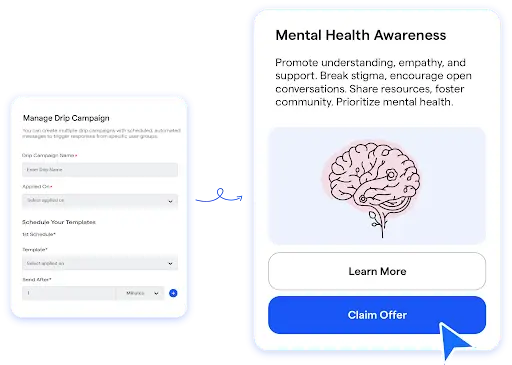
The healthcare chatbot can offer preliminary mental health assessments to identify needs and suggest further professional support if required.
Offering Techniques for Stress Management and Relaxation
Chatbots can guide patients through various techniques for stress management and relaxation, aiding in overall mental well-being.
Connecting Patients with Mental Health Professionals and Support Groups
Healthcare chatbot can provide essential links to mental health professionals and peer support groups, offering crucial resources for those in need.
5. Post-Discharge Support & Medication Management
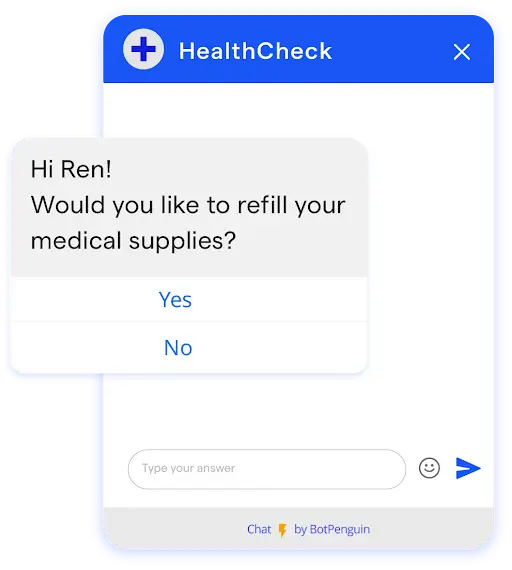
Post-discharge, chatbots can guide patients through recommended steps to ensure a smooth recovery, addressing any concerns that may arise.
Providing Medication Adherence Reminders and Education
To prevent rehospitalizations, chatbots ensure patients adhere to their medication schedules and understand their purpose and effects.
Answering Questions and Addressing Concerns About Discharge Instructions
Healthcare chatbot can clarify any uncertainties regarding discharge instructions, ensuring patients feel confident managing their recovery at home.
6. Chronic Disease Management & Health Tracking
For chronic disease management, a healthcare chatbot can monitor symptoms and vital signs, alerting healthcare providers of potential issues.
Encouraging Healthy Habits and Lifestyle Modifications
Chatbots encourage patients to adopt healthier habits that can mitigate the impacts of chronic conditions, enhancing quality of life.
Providing Feedback and Motivation to Patients
Regular feedback and motivation from chatbots can help patients stay committed to their health goals, ensuring long-term positive outcomes.
7. Accessibility & Language Translation
The healthcare chatbot can provide support in multiple languages, making healthcare more accessible to diverse populations.
Ensuring Accessibility for Patients with Disabilities
Chatbots are designed to be accessible, helping patients with disabilities manage their health independently.
Breaking Down Complex Medical Jargon into Easy-to-Understand Language
Complex medical terms are simplified by chatbots, making health information more digestible for patients without a medical background.
Suggested Reading:
Future and Growth of Global Healthcare Chatbot Market
8. Administrative Tasks & Billing Inquiries
The healthcare chatbot can offer detailed information on insurance coverage and benefits, helping patients understand what services are available to them.
Facilitating Online Bill Payments and Cost Estimates
For convenience, chatbots facilitate online payments and provide cost estimates, making financial transactions smoother.
Assisting with Referrals and Pre-Authorization Processes
Chatbots can streamline the referral and pre-authorization processes, reducing administrative burdens for both patients and providers.
9. Research & Data Collection
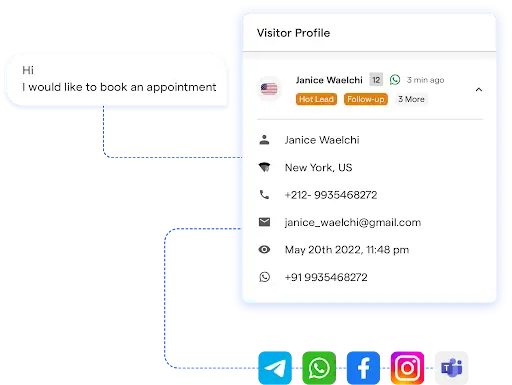
The healthcare chatbot efficiently collect patient feedback, which is crucial for improving healthcare services and patient satisfaction.
Facilitating Anonymous Surveys and Data Collection for Research Studies
Healthcare chatbot, like BotPenguin, can conduct anonymous surveys and gather data for research, helping to advance medical knowledge and practices.
Using Chatbot Interactions to Identify Trends and Improve Patient Outcomes
Analyzing interactions with chatbots can help identify health trends and improve outcomes by adapting services to meet patient needs effectively.
How the Healthcare Chatbot help you grow your Healthcare Business
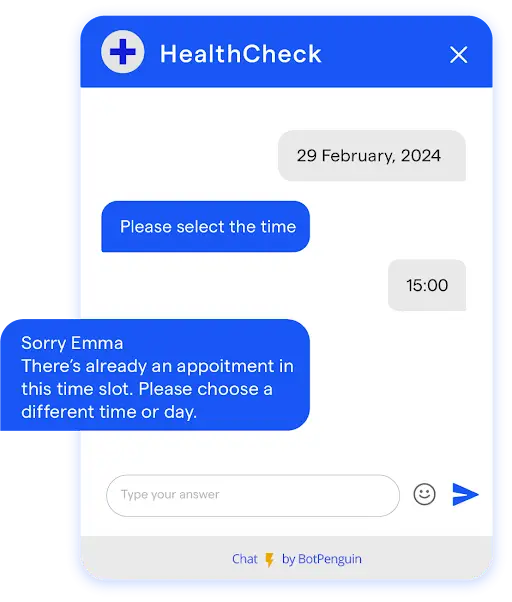
The integration of the healthcare chatbot into medical services not only aligns with the technological evolution of the industry but also serves as a strategic approach to enhance business growth. Here’s how:
Enhancing Patient Experience
The healthcare chatbots, like BotPenguin, can significantly improve the patient experience, which is central to growing your healthcare business.
By providing immediate responses and 24/7 support, chatbots ensure that patients feel heard and valued at any time of the day.
This accessibility reduces frustration from waiting times and missed communication, leading to higher patient satisfaction and loyalty.
Satisfied patients are more likely to return and recommend your services to others, organically growing your patient base.
Streamlining Appointments and Scheduling
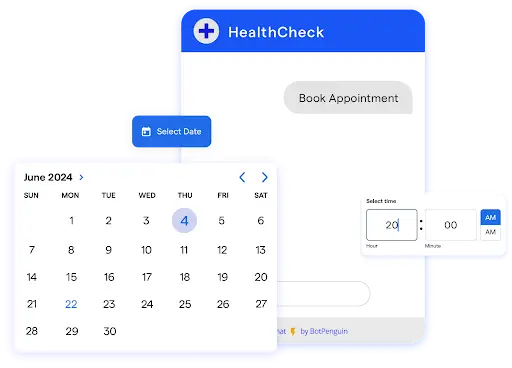
The convenience of scheduling appointments through chatbots cannot be overstated.
Patients can book, reschedule, or cancel appointments through simple chat interactions, which the system processes instantly.
This reduces the administrative burden on your staff, minimizes human error, and optimizes your appointment calendars.
Efficient scheduling ensures better patient flow and allows you to serve more patients effectively, directly contributing to business growth.
Cost Reduction Through Automation
Operating a healthcare business comes with significant costs, many of which are tied to administrative tasks.
The healthcare chatbots, like BotPenguin, can automate several of these tasks, such as answering frequently asked questions, patient intake processes, and follow-up communications.
By handling these duties, chatbots allow you to reallocate resources and human capital to more critical areas, resulting in cost savings and operational efficiency.
Gathering Patient Data and Insights
Chatbots can collect and analyze patient data over time, providing valuable insights into patient needs, behaviors, and preferences.
This data-driven approach enables you to tailor your services, enhance patient care, and identify new business opportunities.
Moreover, leveraging this information can help in predictive analysis, enabling preventive healthcare measures, and personalized patient journeys.
Suggested Reading:
Launching Healthcare Chatbot in 8 Easy Steps with BotPenguin
Increasing Accessibility and Reach
The digital nature of chatbots allows your healthcare business to break geographical barriers.
Patients from different locations can easily access your services through chatbots, expanding your reach beyond the local community.
This increased accessibility opens up new markets and patient demographics, contributing to your business’s growth and expansion.
Improving Health Outcomes
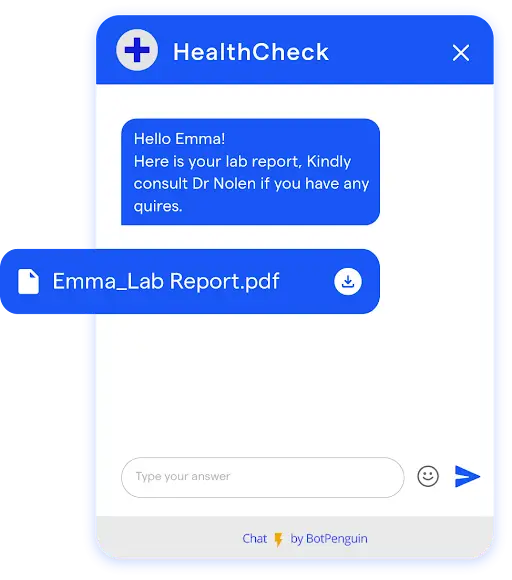
Ultimately, the success of a healthcare business is measured by the health outcomes it achieves.
The healthcare chatbots, like BotPenguin, contribute to better health outcomes by ensuring patients have immediate access to health information, reminders for medication and appointments, and preliminary diagnostics.
These factors encourage engagement and adherence to treatment plans, leading to healthier patients.
Conclusion
In conclusion, the integration of AI chatbots in healthcare is revolutionizing patient care and medical operations.
From improving patient engagement to streamlining administrative tasks, chatbots for healthcare are proving to be invaluable assets in the modern healthcare landscape.
The best healthcare chatbots are not just enhancing efficiency but also personalizing patient experiences and providing round-the-clock support.
As we've explored these innovative applications, it's clear that AI chatbots for healthcare are set to play an increasingly crucial role in the future of medicine.
Platforms like BotPenguin are at the forefront of this revolution, offering customizable AI chatbot solutions that can be tailored to specific healthcare needs.
Whether it's appointment scheduling, symptom assessment, or mental health support, BotPenguin's chatbot for healthcare can be adapted to various medical applications.
As technology continues to advance, we can expect AI chatbots in healthcare to become even more sophisticated, potentially integrating with other emerging technologies like IoT and wearable devices.
The future of healthcare is undoubtedly intertwined with these intelligent digital assistants, promising a more efficient, accessible, and patient-centric healthcare system.
Suggested Reading:
Why Investing in a Healthcare Chatbot is a Smart Move?
Frequently Asked Questions (FAQs)
How can a chatbot be used in healthcare?
Chatbots assist with booking appointments, providing health information, offering medication reminders, and answering general patient inquiries.
What is the future of healthcare chatbots?
Healthcare chatbots are expected to become more intelligent, predictive, and integral to patient care and health management.
What are the 3 basic types of medical chatbots?
Medical chatbots include health information bots, medication reminder bots, and appointment scheduling bots.
Will chatbots replace doctors?
No, chatbots complement doctors by handling routine tasks, but they cannot replace human expertise and medical judgment.
Do hospitals use chatbots?
Yes, many hospitals are implementing chatbots to enhance patient interaction and streamline administrative tasks.


